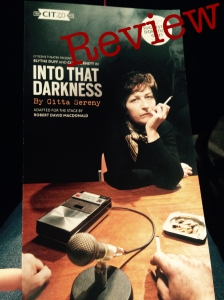
This post is a review of the stage adaptation of Gitta Sereny’s book, ‘Into that Darkness’ at the Citizens Theatre, adapted for theatre by Robert David MacDonald. The book is about convicted Nazi war criminal Franz Stangl, and the darkness of the title seems to me a reference to the darkness of human nature and what people are capable of. Gitta’s interviews with Stangl seem intended to explore what could have made him oversee the deaths of close to one million people in extermination camps. A particularly poignant moment reveals that in order to carry out his orders, Stangl stopped considering Jews as people, but rather as ‘cargo’.
I found the set and lighting very effective, particularly as I had never seen anything like it. The stage was set to appear like a prison interview room, fronted by a plastic window, boxing the actors in. This drew the audience into the scene, making us feel as though we were in a prison or police station observing the interviews. I felt this gave the audience a sense of power over, or at least detachment from, the scene, which may have been intended to point out that people tend not see any connection between themselves and someone like Stangl. This sense of detachment and superiority was unsettled by the complete, disorientating blackouts between each scene, with loud train like sounds, followed by painfully bright lights turned on the audience, bright enough that I noticed several people around me shielding their eyes, before we were allowed to see the stage again. This removed the audience’s sense of power, and brought us uncomfortably close to the extermination camps being discussed on stage. The set, sound and lighting also forced the audience into a position of involved, rather than detached observation, which made me think about the issue of culpability by inaction, in this case specifically about people who were aware of what was happening at concentration and extermination camps, but turned a blind eye, for fear of the Nazis, pointing out the darkness in human nature that will instinctively prioritise our own well-being over that of others, even in such extreme circumstances.
The Citizens Theatre
Blythe Duff’s portrayal of Sereny was very powerful. She created convincing tension between her attempts as an interviewer to make Stangl feel comfortable enough to open up to her about his character and background in a way that he hadn’t in previous interviews, and obvious disgust and judgement at what he was part of. In the second half in particular, she seems unable to stop herself openly challenging him, and expressing her anger, upset and disgust.
However, I found Cliff Burnett’s representation of Stangl much less convincing, because his acting was very wooden. While this was effective when he was in militant officer mode, obsessively cleaning the interview room and tidying his appearance, which is connected to his regimented carrying out of orders in the camps. However, there were moments throughout the play where he attempted to convey emotion – frustration, laughter, tears – none of which I found at all convincing, which was unfortunate as it somewhat undermined the suggestion of a connection between Stangl’s character and the audience. Brief moments of believable human emotion would have made his performance much more poignant.
The other two characters who made up the cast were Stangl’s wife, Thea, played by Molly Innes, and one male chorus actor, played by Ali Craig, who portrayed various characters in Stangl’s story. I felt that this part was somewhat unnecessary, and personally I would have preferred Stangl’s entire story in his own words, but perhaps this would have required a stronger actor than Burnett. However, I found Thea’s perspective very interesting. Her point of view gave a sense of humanity to Stangl that Burnett’s performance failed to deliver, and Innes’ delivery of Thea’s gradual discovery of what exactly her husband’s job involved was emotional and compelling, particularly her mental struggle with Sereny’s question of whether, if given the choice, her husband would have chosen her and his family, or his job.
Despite my disappointment at Burnett’s performance, I really enjoyed the play and its powerful impact on the audience. Girl power is out in full force in this show, as it is carried by Duff and Innes, enhanced by the set design, sound and lighting, and I would highly recommend going to see the show, if only to see their performances.
Kirsty x

